Jaguar I-Pace MY24 review: big on style and performance
Jaguar’s lone EV offering provides an exceptional driving experience in a familiar setting

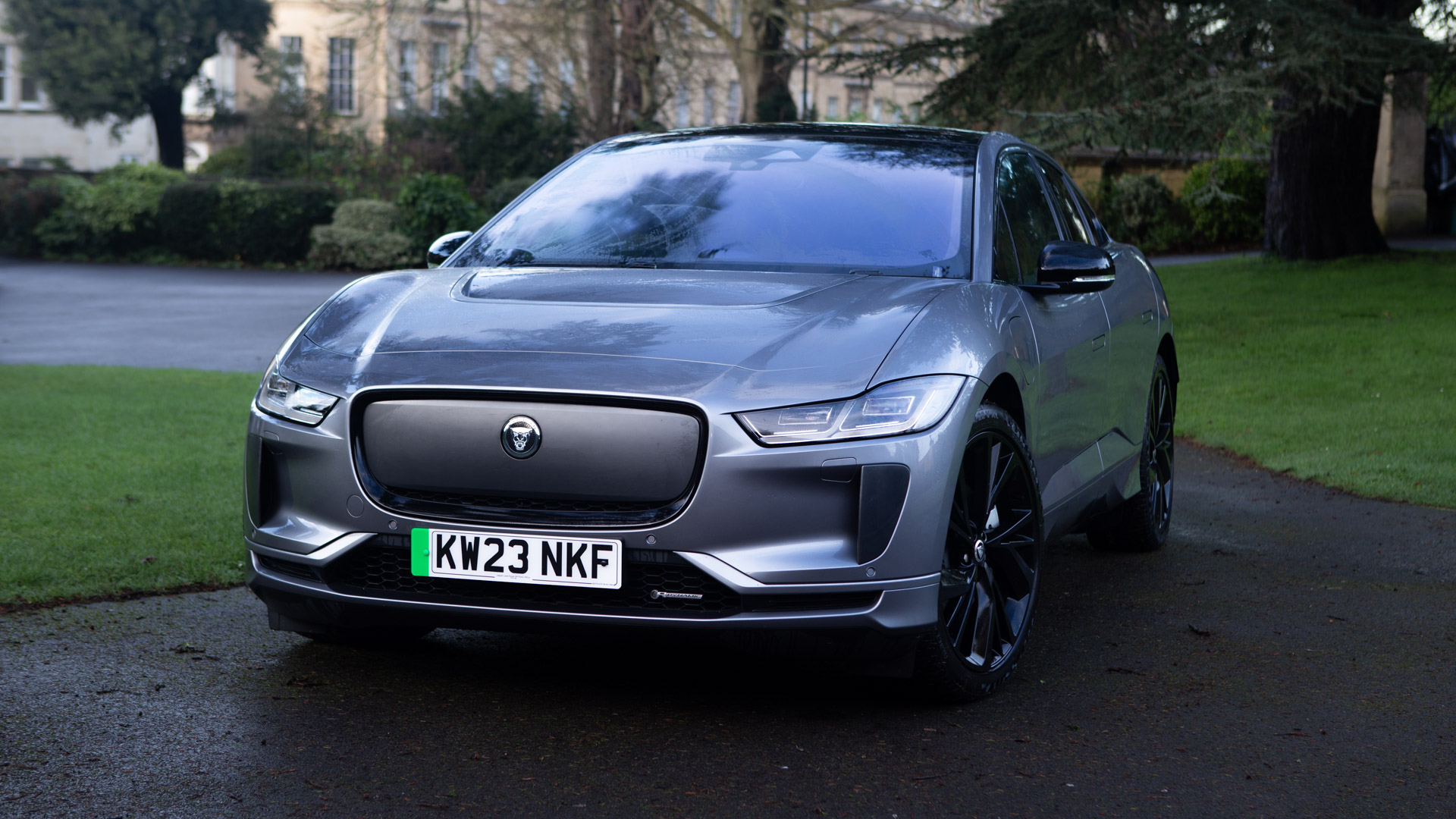
The I-Pace is a great-looking EV that offers impressive performance and is a lot of fun to drive. The interior doesn’t feel as modern as some EVs, with relatively small screens and an abundance of buttons, but that may suit some users. Its range is also looking a bit short compared to more recent competition. Still a great choice for city commuters.
-
+
Great looks
-
+
Extremely fun to drive
-
+
Fully loaded with tech
-
-
Real range is low
-
-
Interior needs a refresh
Why you can trust T3

Jaguar’s I-Pace has been around for a relatively long time in electric vehicle terms. The car first went on sale in 2018 and has been a popular choice, especially among company car users.
In 2023, the I-Pace got a refresh, including some exterior improvements and technology upgrades that have made it a more appealing choice for new EV buyers. However, a new Jaguar electric model is expected to be unveiled in 2024 in addition to Land Rover’s recent electric Range Rover announcement, at which point the I-Pace is expected to be retired.
With so many fans of the I-Pace, I was keen to see what the 2024 refreshed edition brought to the table and how the car holds up in an increasingly competitive premium electric SUV market.
I spent nearly two months using the all-electric Jaguar I-Pace as my daily driver, and I quickly learned why it continues to be a popular choice. It’s by no means perfect, and there are certainly other models to consider in this bracket, but the I-Pace definitely holds its own.
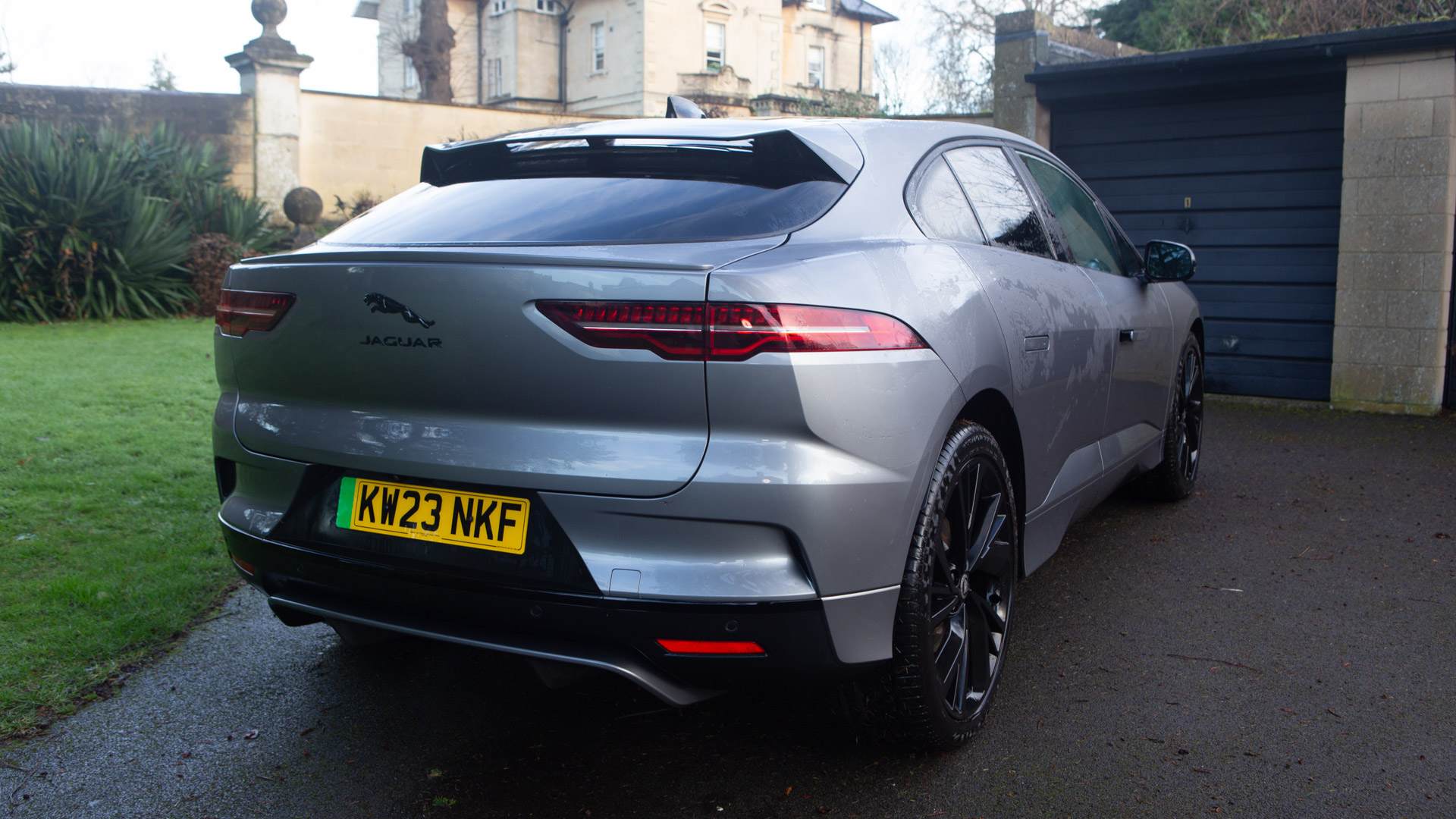
Price and availability
The Jaguar I-Pace starts from £69,995 in the UK or $72,000 in the US. There are two main models to choose from, the R-Dynamic and the new top-of-the-range 400 Sport model, which adds air suspension as standard and performance seats among other upgrades.
The model I tested was the R-Dynamic HSE Black EV400, the highest spec of the R-Dynamic versions with a total on-the-road price of £83,775 ($78,825 in the US). This is a similar price to the Mercedes EQC SUV – a model also expected to be discontinued next year – and the excellent BMW iX, which starts from £70,985. The Mercedes EQE SUV is a little higher at around £90,560.
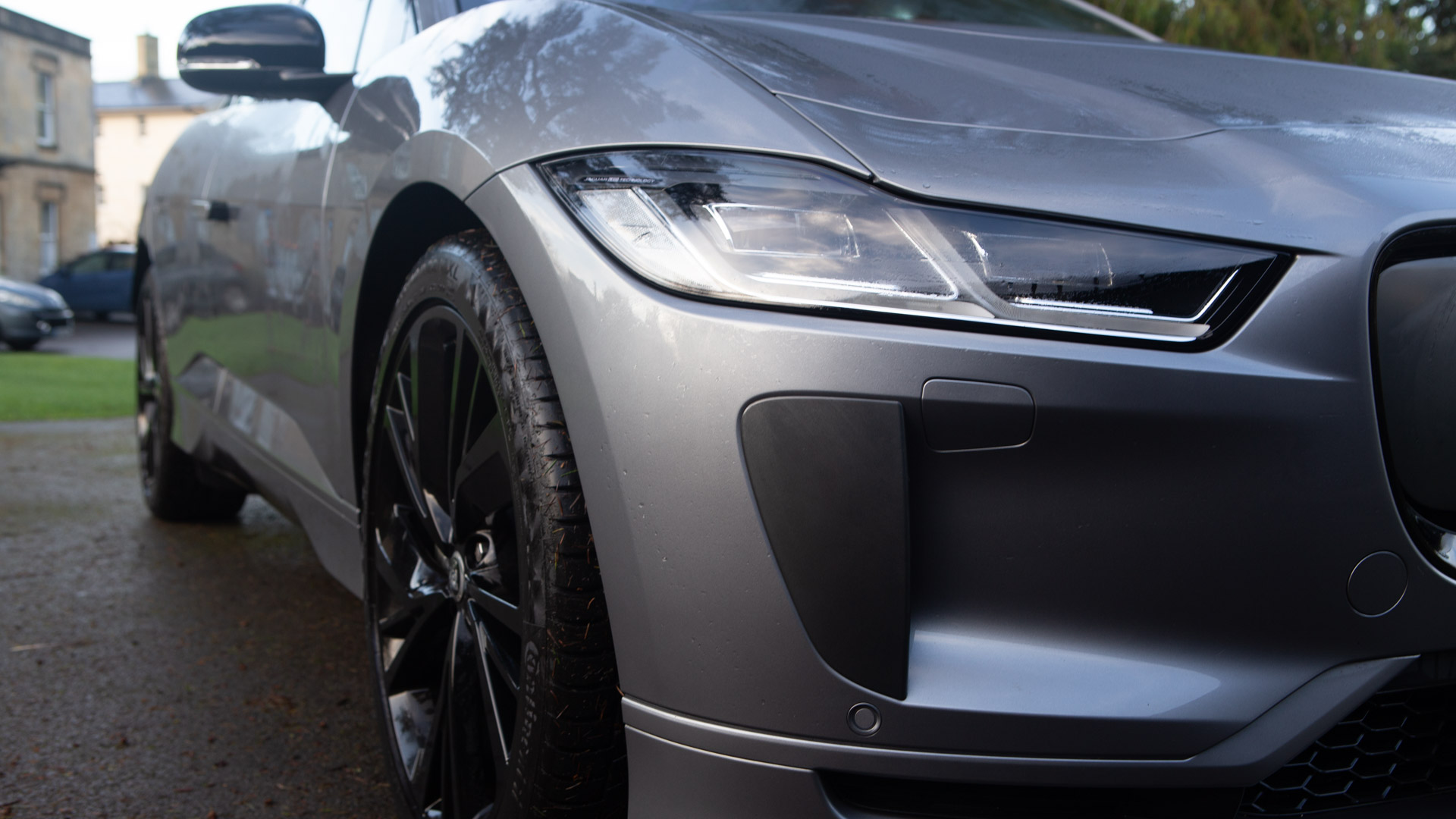
Design and features
In a world of SUVs, the I-Pace is definitely a bit sportier. It’s more of a crossover if you had to define it. Taller than a standard saloon or sedan model with a large boot capacity, but an aerodynamic rear, complete with a sloping rear window and tailgate spoiler.
Get all the latest news, reviews, deals and buying guides on gorgeous tech, home and active products from the T3 experts
The solid grill and narrow LED headlights give the front of the car a mean and sporty look while the large 22-inch alloys really fill the wheel arches adding to that sporty persona. By SUV standards, this isn’t the biggest of cars, at just under 4.7 metres in length and 1,566m in height but it still weighs in at just under 2.7 tonnes.
There’s some rather angular styling across the body, including a hard line along the sides and the various aero features in the bonnet. Finished in the Elger Grey, the I-Pace is very monochromic and despite the larger dimensions, feels every bit a Jaguar.
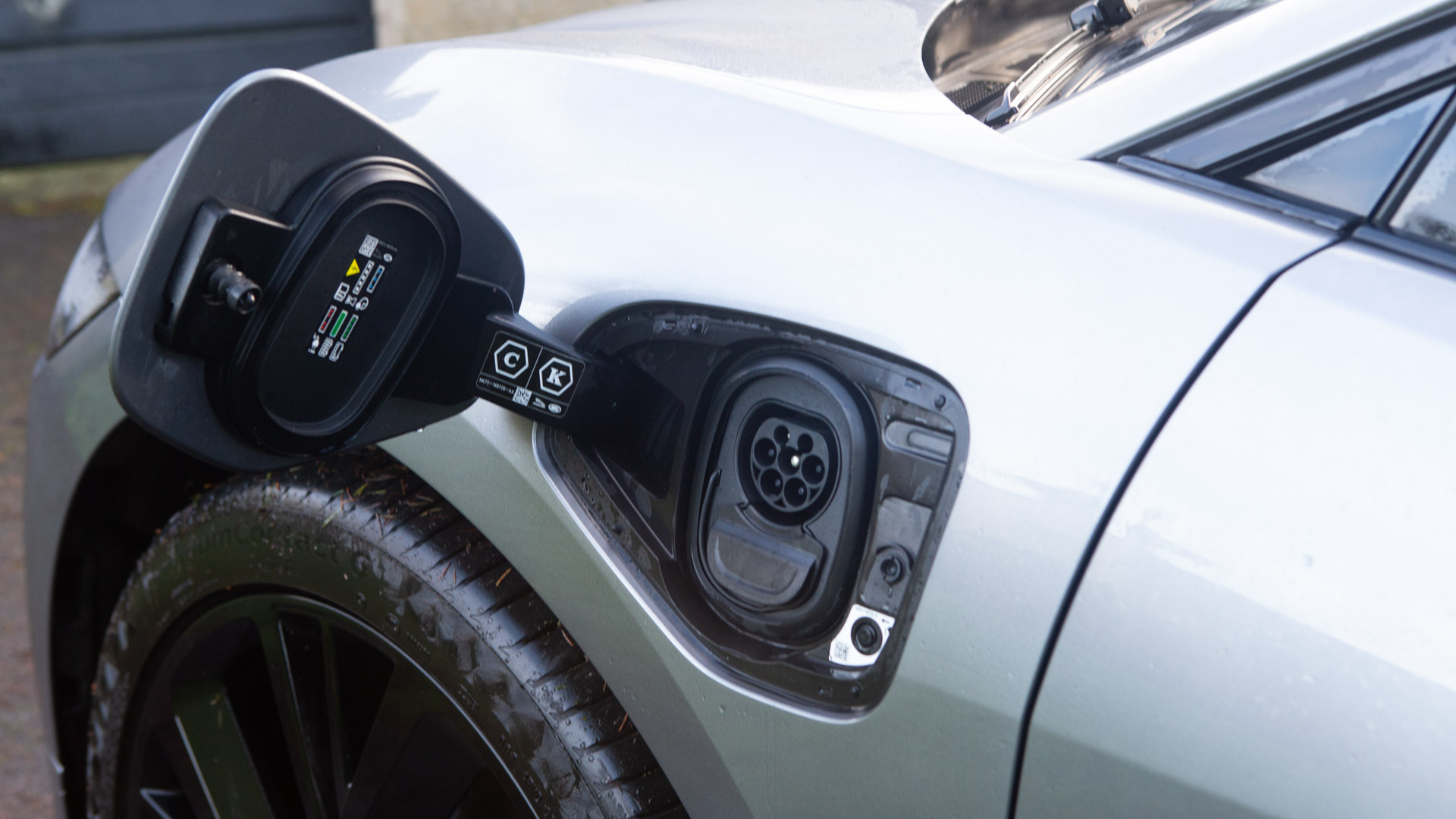
One sign that this car has been around for a few years now is the placement of the charging port. This is on the front left wing (for right-hand drive models), as opposed to being in a more traditional rear position that recent EVs have returned to. It does mean easier forward parking for fast chargers – though interestingly the tell-tale fuel arrow on the dash (which can normally be relied on as a guide) actually points to the right.
Inside the car, the cockpit feels very much like a Jaguar, with plenty of manual buttons and dials alongside the digital screens. There’s a large digital display behind the steering wheel for the driving information and a 10-inch centre display, which runs Jaguar Land Rover’s Pivi Pro OS. This is a great-looking operating system that includes a range of embedded apps, dual SIM data connection and support for Apple CarPlay and Android Auto. It also connects to the Jaguar Connect app (more on that below). There’s also a head-up display which shows speed information, as well as media and navigation when using the Jaguar navigation system.
There’s an additional 5-inch screen underneath that provides climate control, along with the two large pull-and-press dials to control the temperature of the car and the heated/cooled seats.
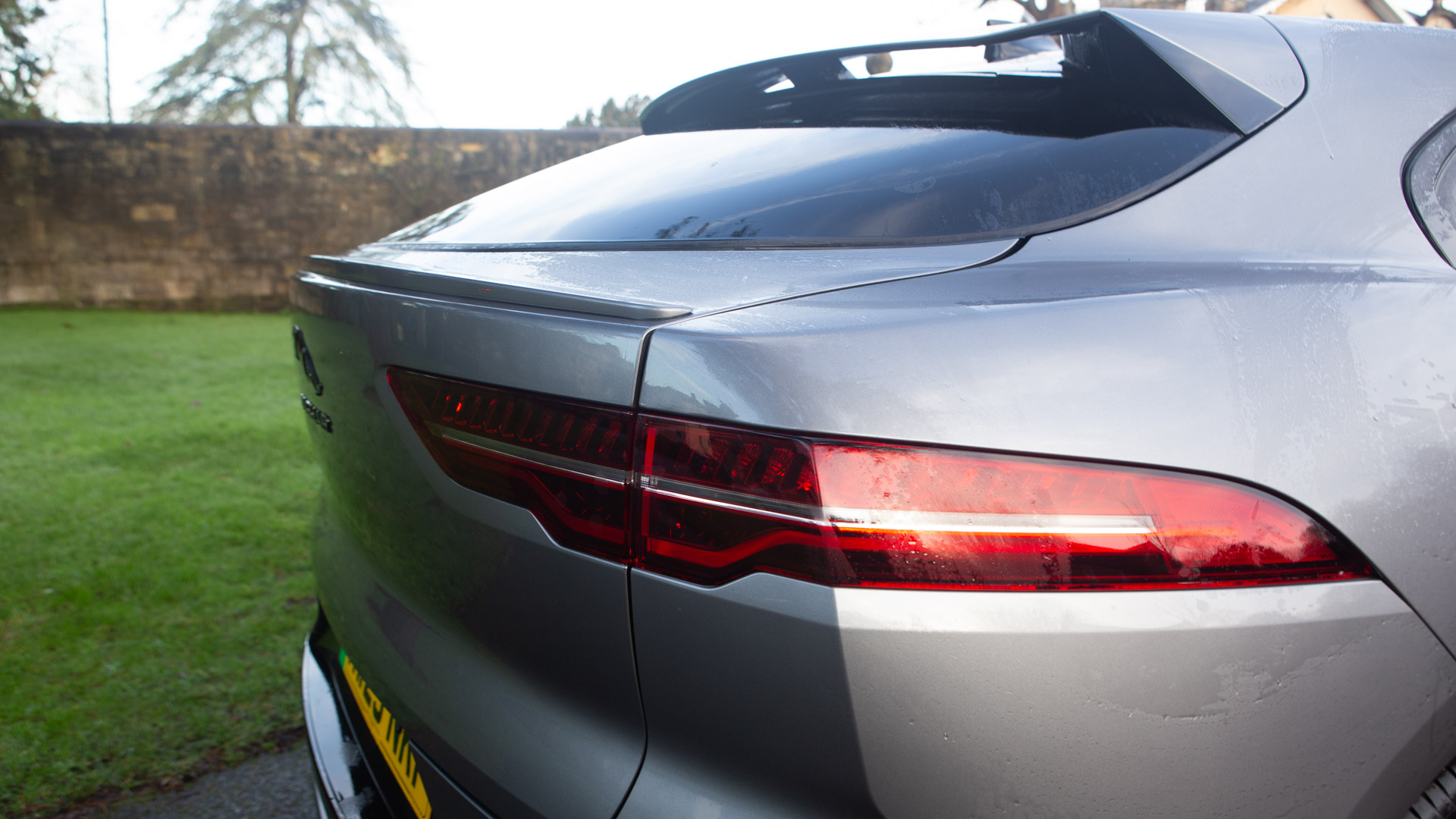
Electric vehicles have been seen as an opportunity for many manufacturers to reinvent the gear selector, from VW’s dial on the side of the steering wheel to Tesla’s controls on the steering wheel itself. In the I-Pace, the gear selectors are a series of push buttons that are mounted into the main central column. This is something I’ve only previously seen on American GM and Lincoln cars and strangely seems to date the I-Pace rather than make it feel more modern.
On the other pillar, there are further buttons for the dynamic drive modes and the car's ride height – using the optional air suspension. In 2023, I feel there are much neater vehicle controls available, even in other Jaguar Land Rover models. Also, that 10-inch centre screen feels particularly small these days.
Like so many other SUV-style cars, the dash is extremely deep on the I-Pace, with the windscreen extending far out in front. While the pillars are also quite chunky, this doesn’t impact your field of view.
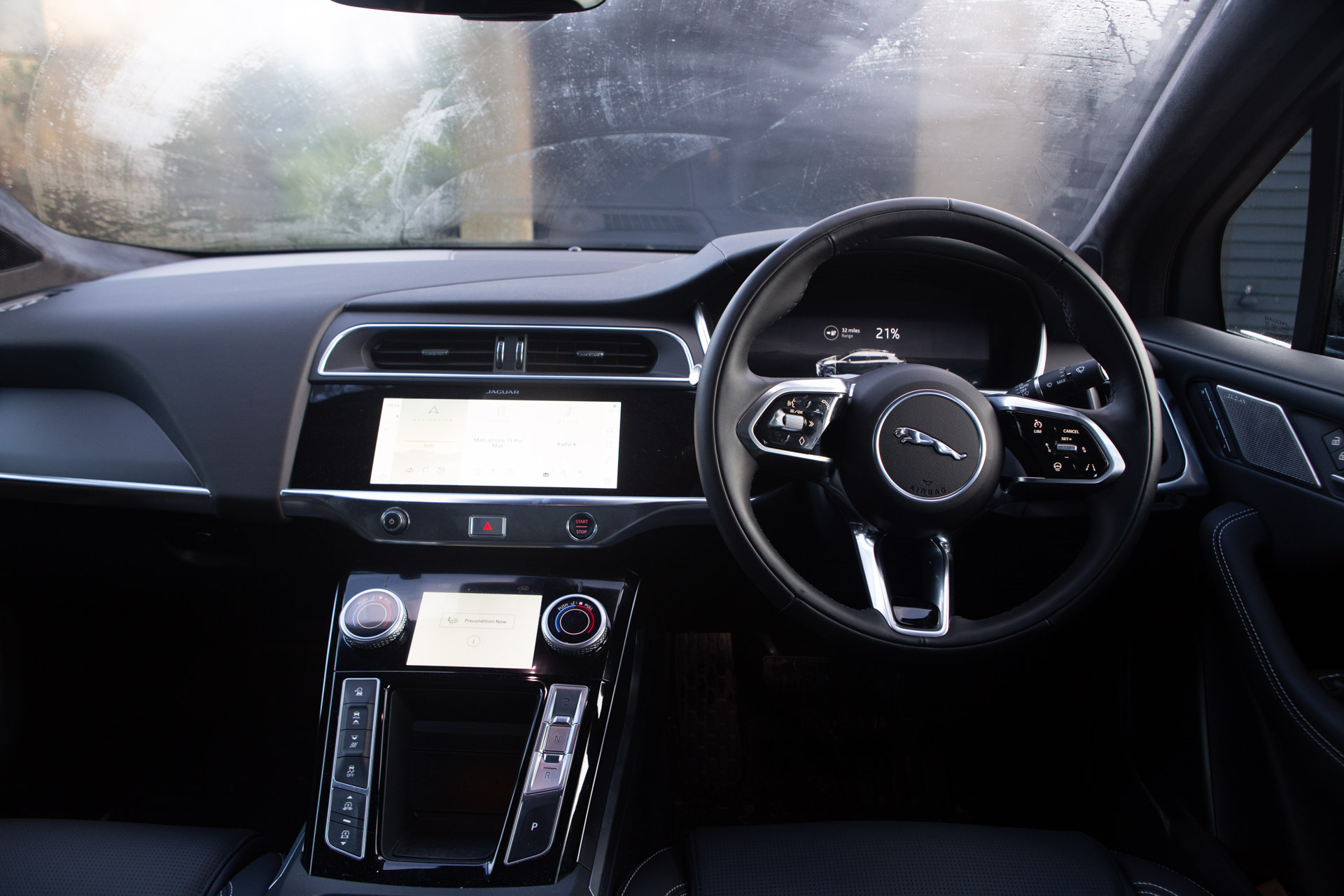
Tech inside the car
The model I tested had been fully kitted out with all the tech options that the I-Pace offers, making it a lot of fun to drive. The Wi-Fi and Data Plan means that the car provides a Wi-Fi connection that others in the car can join with their phones or even laptops. This is extremely handy for those social-media-hungry passengers and also came in useful when I had to take a few video conference calls from laybys and charging stations.
As standard the car comes with a 12-month Secure Tracker subscription, which can be extended to 36 months as an add-on. This Thtcham S7 system can be controlled from your app (see below) and will track the vehicle if it’s stolen, helping police to recover the vehicle.
The Pivi Pro infotainment system includes Amazon Alexa voice control for hands-free operation of many of the car's features, including climate and navigation. There are also wireless Apple CarPlay and Android Auto connections. A single phone charging plate sits under the centre console and there are both USB-A and USB-C port connections in the centre storage bin.
Not forgetting about the sound, the I-Pace I tested comes with a Meridian 3D surround sound 17-speaker 750-Watt system as standard. The sound is extremely impressive from it, both at low and high volume, though does lack the crispness of some top-end systems.
The Matrix LED headlights not only include the signature daylight running lights, but for night-time driving they have an adaptive main beam that can be turned off in strips, allowing for maximum visibility without dazzling oncoming traffic.
Adaptive cruise control comes as standard on the I-Pace, as part of the driver assistance offerings. This also includes steering assist, traffic sign recognition, adaptive speed limiter and lane keep assist. This system does a great job of taking the stress out of any drive, whether it’s on an empty motorway or sitting in a city traffic jam. Once the adaptive cruise control is engaged, you can keep your feet off the pedals, and while you need to keep your hands on the wheel, the steering assist does a decent job and keeping you centred in the lane at all times.
Driving assistance also includes front and rear parking aids in the form of wide and narrow camera views at the rear and parking sensors on all sides. The parking sensors are a little sensitive at times but do provide a virtual impression of the distance to surrounding objects on the screen. I did miss having the top-down camera views that some cars offer, by combining multiple camera views.
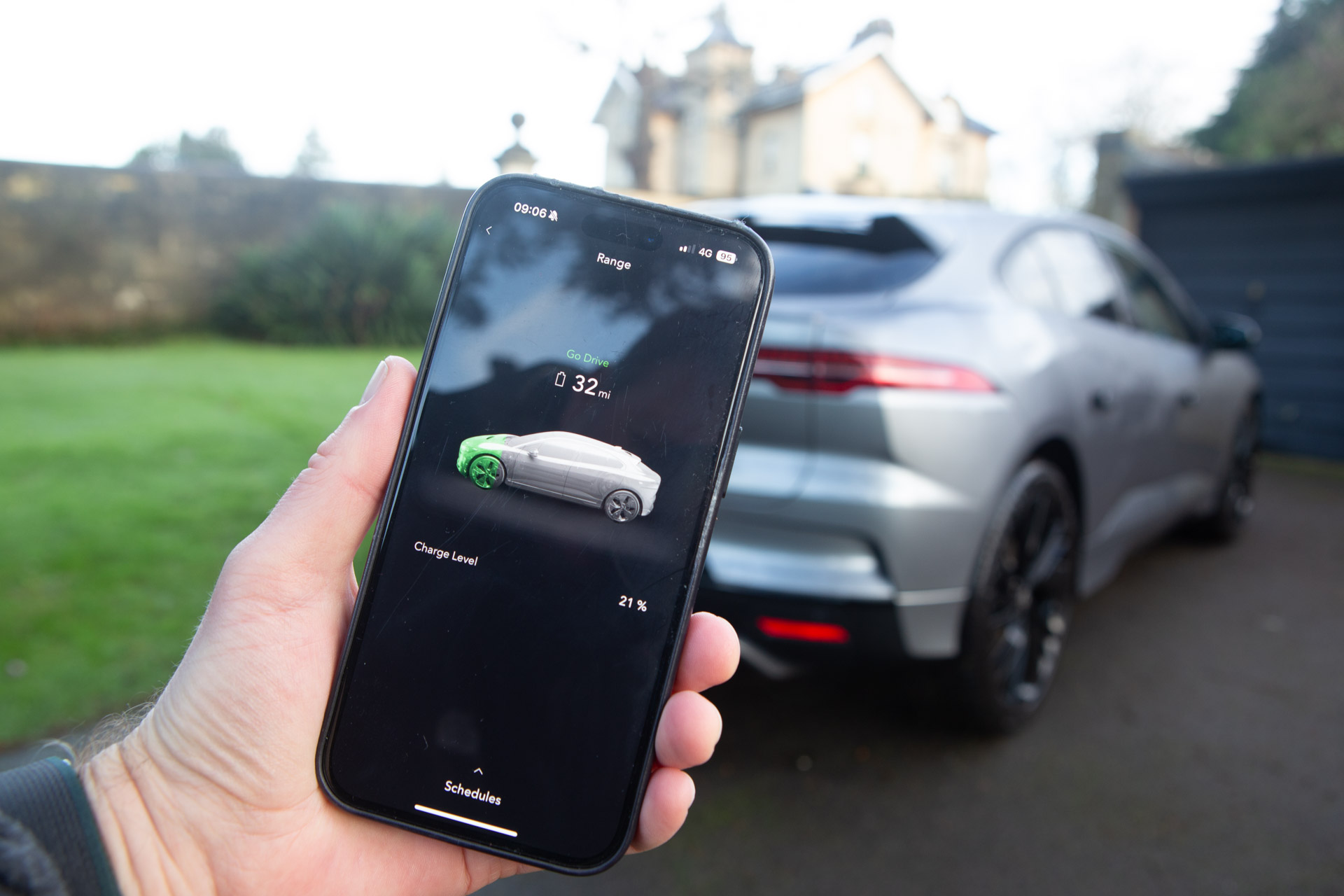
Jaguar remote connect app
Like most electric vehicles (and some ICE models) the Jaguar I-Pace comes with a companion app. The Jaguar Remote app is available for Android and iOS devices and provides both information about the status of the car and allows you to control a range of features remotely.
The ability to check the current charge – and therefore the range – of the car is very handy, especially while the car is on charge. When using a fast charger at a service station, or with the car plugged into a home EV charger, I would check the app to see how long I still had to go.
If you’re parked somewhere unfamiliar, the Guardian Mode in the app will monitor your vehicle and alert you if anyone attempts to open the car, or starts the power. You can also get a quick check that all doors (including bonnet and boot) and windows are closed.
The remote features of the app allow you to turn on the climate control, so that you can pre-heat (or cool) the car before you get into it. Especially handy on a frosty morning, as it will clear your windscreen too. If you’re trying to find your car in a busy car park, you can also get the car to beep and flash its lights – without having to open and close the doors – making it easier to spot. This actually saved me lots of time on a few occasions.
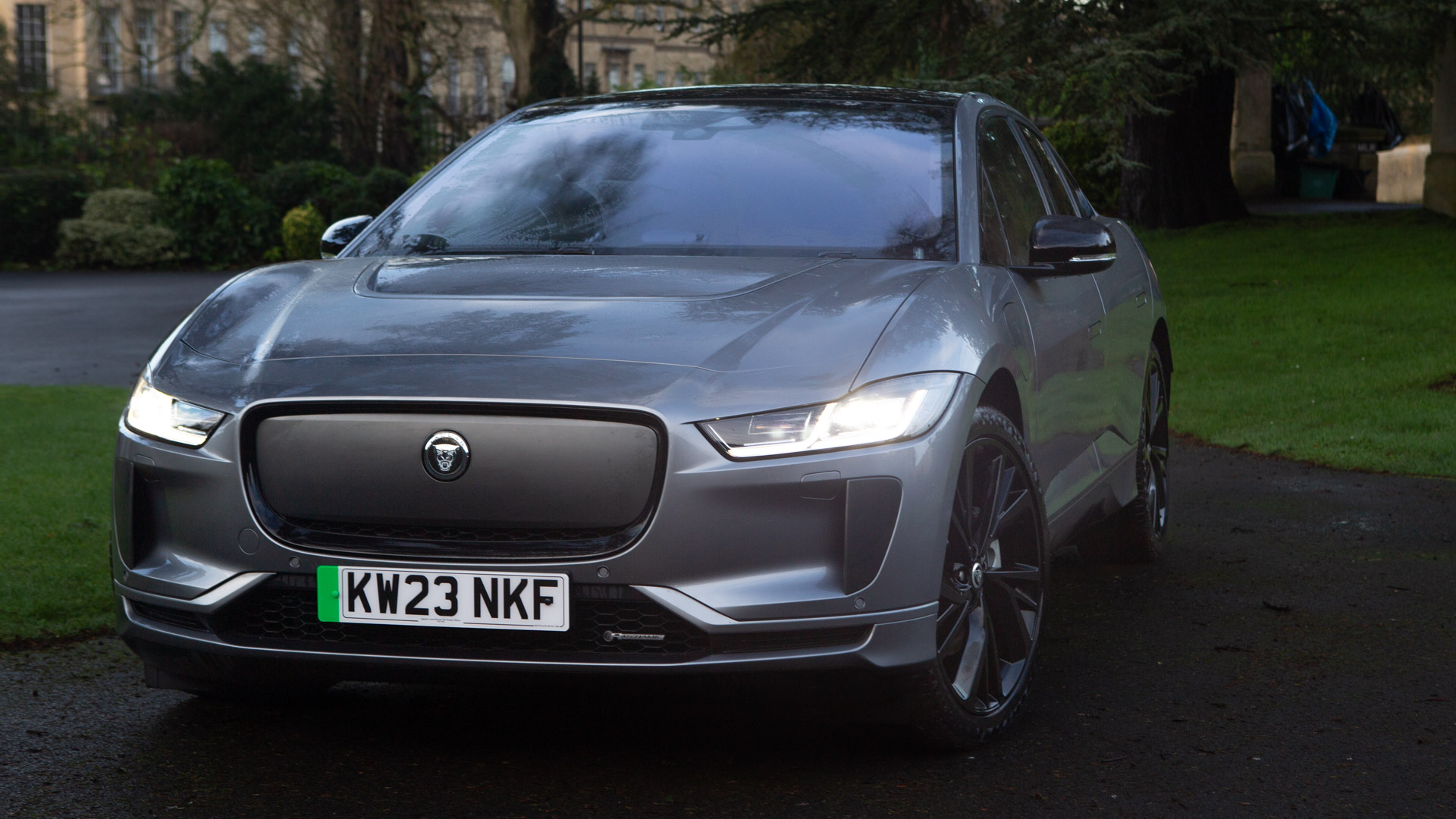
Drive and performance
Despite being quite a large car, the I-Pace delivers a max power of 400 mechanical horsepower (PS) and a 0-62mph acceleration of 4.8 seconds (4.5 seconds 0-60mph). While that’s not quite Porsche Taycan speed, it’s pretty fast for an SUV-styled EV.
The driving position isn’t too high, keeping a sportier feel, and the steering is responsive, giving you plenty of control. I’ve seen other reviews describe this as heavy, but I didn’t feel that was the case – however, I’m not a fan of overly lightweight steering.
The model I drove featured the air suspension, so despite the 22-inch alloys, the ride was very pleasant. The adjustable ride height meant that the car lowers itself at higher speeds, to improve the aerodynamics and can be raised for those muddy country lanes.
Even in standard driving modes, the car handles exceptionally well, and putting it into the Dynamic mode just tightens everything up a bit and makes you feel you’re in a true sports car. The dual motor gives the car all-wheel drive and makes even cornering at speed a breeze.
This is an excellent car for longer journeys too, thanks to its large comfortable leather seats, both front and rear, as well as comfort features such as the heated steering wheel and both heating and cooling on the front seats.
The only real downside to using the I-Pace for longer trips is the car’s range. While its 292-mile range was impressive a few years back, today it feels slightly low. For comparison, the Mercedes EQE SUV has around 334 miles of range and the BMW iX has up to 380 miles. I found the real-world range for the I-Pace was closer to 260 miles, while in winter temperatures you get closer to 200 miles.
DC charging is also limited to 100kW on the I-Pace, so my average top-ups were usually 30-40 minutes to bring the car back up to 80%. For home chargers though, it will allow both 7kW and 11kW chargers to be used (though not the 22kW models) to deliver a full charge in as little as 8.6 hours.
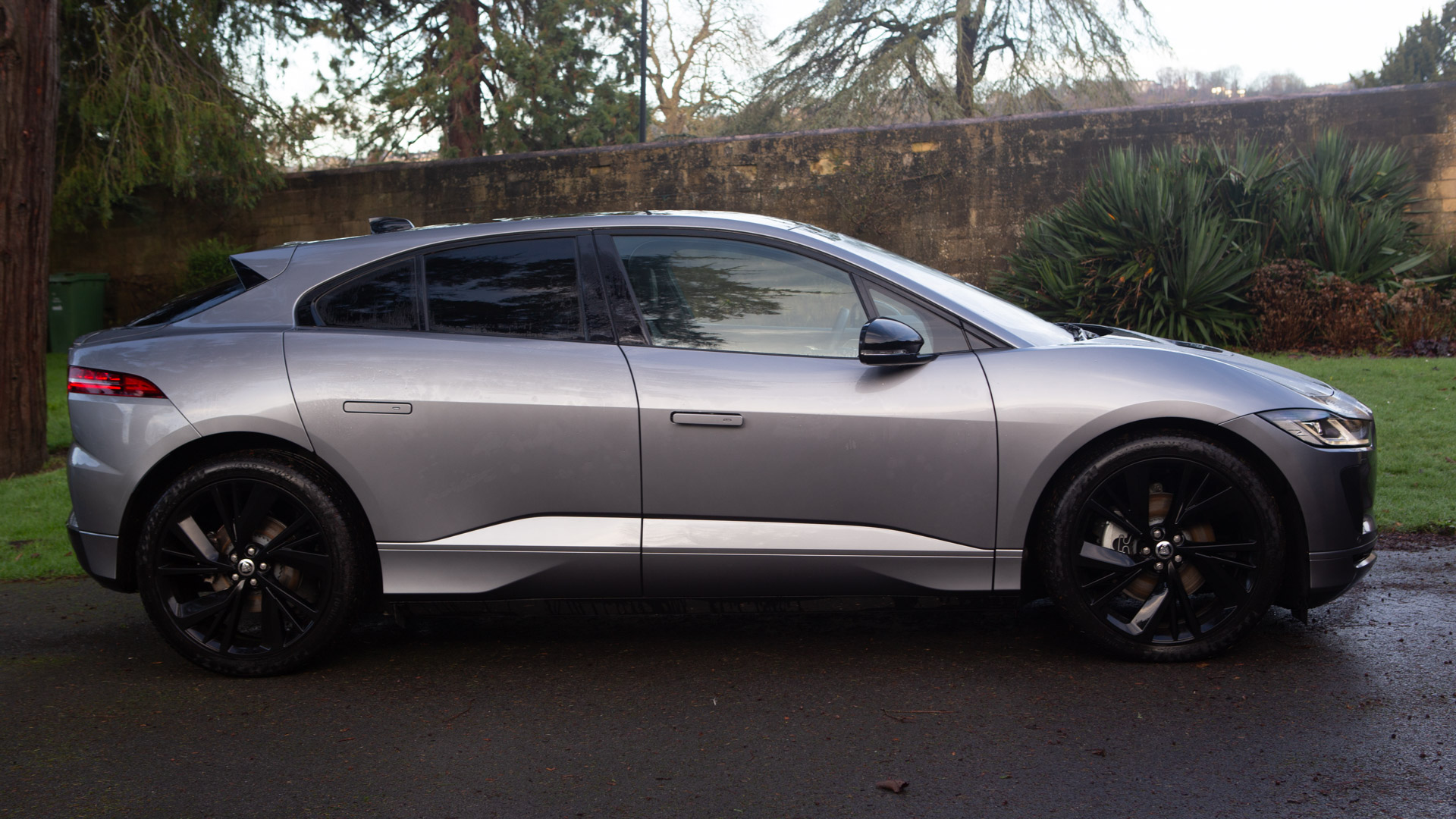
Should I buy a Jaguar I-Pace?
The Jaguar I-Pace is one of the best-looking EVs on the market right now and for those looking for a large and luxury option, it makes a lot of sense. It’s a shame to think this car may be coming to the end of its life in the next year, rather than getting a few more useful updates.
For those new to EVs, the interior is non-threatening and the driving experience is extremely impressive. For the more technology savvy though, the interior lacks the minimalism and giant screens of some of the competition.
While the range of the I-Pace isn’t great for longer distances, for the everyday commuter doing under 150 miles a day, it’s perfect. As with any electric car, having a home charger transforms the experience, and for most drivers you will probably only need to plug it in a couple of times a week.

As T3's Editor-in-Chief, Mat Gallagher has his finger on the pulse for the latest advances in technology. He has written about technology since 2003 and after stints in Beijing, Hong Kong and Chicago is now based in the UK. He’s a true lover of gadgets, but especially anything that involves cameras, Apple, electric cars, musical instruments or travel.